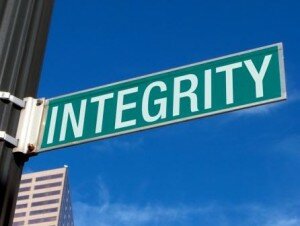I had a serendipitous moment yesterday while (finally) writing this post. I saw a tweet come up from one of my peeps, Albert Maruggi (@AlbertMaruggi) that simplified my thoughts a bit (thanks Albert!). Our Twitter conversation reads:
Albert: “Lincoln said, ‘Character is what you do when people are not looking.’ Social media are the constant eyes focused on brands. Now what?”
Me:“Integrity better be a priority (smiley face).”
Albert: “Remember what JR Ewing of Dallas TV fame said, ‘Once you get passed honesty, integrity is a piece of cake.’”
Integrity is something I think a lot about. Growing up, “insides matching outsides” (my preferred definition of integrity) was at the top of the “principles you better practice list.” Over the years, that little phrase has transformed into a question I ask myself regularly as well as what I expect from my surroundings (business relationships, employer, professional associations, personal life, etc.). Why? Well, because without truth, what’s the point? How can anything truly successful be built? I don’t think I really need to make a case for what a lack of integrity and honesty leaves in its wake. Just watch the news or read the paper (yes I just said news and paper) and you’ll find many examples of integrity breech.
Integrity has found its rightful place at the head of the business communication revolution table. Words like authentic, transparent and genuine (all synonymous with insides matching outsides) are among the most popular vocabulary words of today. Not because people do these things particularly well, but because the act of exuding these characteristics is highly desirable, especially as it pertains to communicating. Integrity is what we crave and expect in our interactions with other humans (brands) — and we should expect nothing less.
Technology innovations (such as social networks) and Web 2.0 culture (collaboration culture) not only foster this dynamic, but have the ability to hold communicators and businesses accountable to act with integrity, which has ultimately sent a large percentage of folks into panic mode. For the majority, it’s incredibly scary, as we’ve comfortably been living in the one-to-many culture for quite a while, so the ability for anyone to take hold of a message and say whatever they like whenever they like is a tad overwhelming. And why wouldn’t it be? It’s not necessarily businesses that struggle with this are lacking integrity or being dishonest, more so that they are used to talking with people in a much different way as the result of age, business type, poor teaching or advising and the list goes on. The humanizing of brands is in full swing and many company heads are slowly starting to realize that the behavior shift in people (consumers) and the preferred way to communicate is here to stay.
The intersection of new communication tools, like blogs, Twitter, Facebook, LinkedIn, etc. and good ‘ole traditional marketing-communication practice present the ability to do more better, if we choose.
In answer to Albert’s comment/question, “Lincoln said, ‘Character is what you do when people are not looking.’ Social media are the constant eyes focused on brands. Now what?” I think it’s very important to reflect upon a few things here when thinking about engaging in the world of social media:
First: If your character needs an overhaul (meaning, you are dishonest and lame or have other issues), take a look at yourself (business) and take responsibility and action (emphasis on action) for what you can do better.
Second: Consider what you value and how you want to convey that (how it plays into your overall business communication strategy).
The sad reality here is that people are hopping into a very serious set of communication tools without a defined communication strategy or real distinction of what their company or brand truly represents. In essence, lacking a solid foundation from which to build something — not mapping out how to translate their insides (company culture) to the outside (public) successfully.
The next decade will be fascinating to watch. Not just which businesses succeed and how, but how the marketing-communications discipline will change as the result of ongoing innovation and its ability to empower people to hold business and other powerful entities accountable through transparent platforms. It’s just the beginning of it all and can only get more interesting.
What are your thoughts?




 I create purpose-driven experiences that establish meaningful connections between people and brands through the convergence of technology and communication.
I create purpose-driven experiences that establish meaningful connections between people and brands through the convergence of technology and communication.






Pingback: Tweets that mention Integrity, Social Media and Business: One Big Uncomfortable Family - Communications Passionista -- Topsy.com